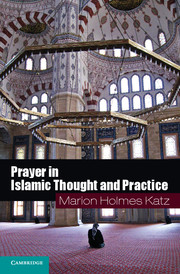2 - Valid prayer and ideal prayer
Published online by Cambridge University Press: 05 April 2013
Summary
As described in the previous chapter, ṣalāt as constructed by the legal tradition is an activity governed by a fairly elaborate set of rules. Although Islamic law was never the only religious discourse shaping the ways in which Muslims practiced and understood ritual prayer (as we shall see, in the premodern period Sufism competed with law as the most influential tradition of piety in this respect), the vast majority of Muslims have historically accepted that the rules generated by legal thinkers set the parameters for valid prayer. Although these rules could be exacting – everything from the necessity of waking before sunrise, to the frequency of prayer, to the restrictions of ritual purity might demand effort and commitment – they were recognized as achievable by ordinary people, rather than requiring the special gifts of the spiritually adept. Ṣalāt may be demanding, but it is eminently doable for anyone determined to do it. Beyond the basic fulfillment of the rules, however, Muslim thinkers recognized that ṣalāt could be performed with varying degrees of attention, sincerity, and emotional intensity. It might merely discharge one’s obligation toward God and thereby avert otherworldly punishment, or it might increase one’s intimacy with the divine. Punctilious performance of the daily prayers might leave one’s sinful nature otherwise untouched, or it could lead to fundamental ethical transformation. Various authors pondered the relationship between legally adequate and spiritually ideal prayer, and explored means to cultivate more profound ṣalāt.
- Type
- Chapter
- Information
- Prayer in Islamic Thought and Practice , pp. 44 - 74Publisher: Cambridge University PressPrint publication year: 2013

